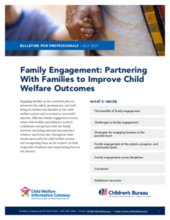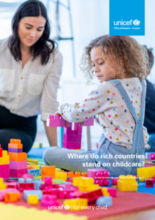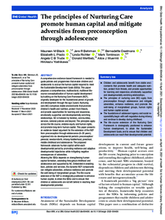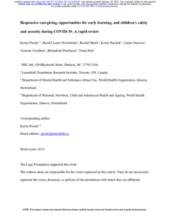Displaying 11 - 20 of 490
Engaging families in the casework process promotes the safety, permanency, and well-being of children and families in the child welfare system and is central to successful practice. Effective family engagement occurs when child welfare practitioners actively collaborate and partner with the family network, including maternal and paternal relatives and fictive kin, throughout their involvement with the child welfare system and recognizing them as the experts on their respective situations. This bulletin for professionals provides an overview of the foundational elements of the family engagement approach, followed by strategies and promising practices for implementing it.
This report published by UNICEF’s Office of Research – Innocenti, ranks countries across the Organisation for Economic Co-operation and Development (OECD) and the European Union (EU) based on their national childcare and parental leave policies.
The WHO South-East Asia Regional Office in collaboration with UNICEF organized a 3-day virtual meeting from 27 to 29 April, 2021.
This webinar, informed by both detailed case studies developed by the Aga Khan Development Network and UNICEF programme implementation in Zambia with the support of the LEGO Foundation, provided a unique opportunity to engage with and understand the experiences of government, development partners, civil society, frontline health workers, and parents in Eastern and Southern Africa.
This video explores the pivotal role of health care practitioners in supporting nurturing care for children.
This document compares three versions of the same home visiting model, aimed at improving parent-child interactions and child development: the well-known Jamaica model, which was gradually scaled up from an efficacy trial (‘proof of concept’) in Jamaica, to a pilot in Colombia, to an at-scale program in Peru.
This series of webinars organized by the CSO Forum Secretariat together with AfECN, UNICEF and WHO sought to strengthen the capacity of CSOs in the area of ECD to ensure greater advocacy for young children in the child rights agenda.
This paper proposes a comprehensive, multisectoral, multilevel life-course conceptualisation of human capital development by building on the Nurturing Care Framework (NCF), originally developed for the foundational period of growth and development through the age 3 years.
This rapid review takes stock of emerging research on nurturing care for young children during the COVID-19 crisis.
This report offers a blueprint for creating equity-centered, anti-racist policies that support the health and well-being of children and families of color.






